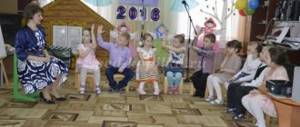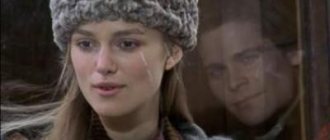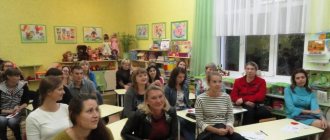MAGAZINE Preschooler.RF
Interaction between the music director and educators in the organization of musical educational activities in the context of the implementation of the Federal State Educational Standard for Educational Education"The main goal of preschool education, which is a thing of the past: to transmit knowledge to pupils, has been replaced by a new function of education - the creation of a unified educational space in which the teacher, music director and other specialists are subjects of professional interaction, and the pupil is a subject capable of self-development.
Each of the specialists solves his own problems, but ultimately everyone has the same goal - the development of the child’s personality and his socialization in society. It can be achieved only by coordinating your actions through pedagogical integration. At present, when one of the requirements of the Federal State Educational Standard is the integration of all educational areas and, consequently, the activities of the entire kindergarten staff in the process of forming integrative personal qualities of children, issues of cooperation between participants in the pedagogical process are highlighted most acutely. In this regard, it is necessary to build a system of work for the interaction of preschool teachers.
The standards of the new generation require the formation of the necessary competencies in children, i.e., the development of the child’s personality, when the content of education acts as a means of its self-development, the preschooler’s mastery of ways of knowing, self-development, and orientation in the world around him. This is what determines the main directions and content of a teacher’s work in the educational field “Artistic and Aesthetic Development” . In preschool pedagogy, music is considered as an indispensable means of developing children's emotional responsiveness to everything good and beautiful that they encounter in life.
The general and musical-aesthetic development of preschool children in kindergarten is carried out by a music director who knows the theory and methodology of the pedagogical process, and a teacher who has general musical training.
The essence of the tasks of joint interaction between the music director and the teacher is to awaken the creative activity of children, develop their musical imagination and thinking, and stimulate the desire to independently engage in musical and creative activities.
Together, teachers must develop children’s musicality, educate their moral sphere, mental processes and personal developments. Thus, the music director and educator must provide for the integrity of music education: training, education, development.
Close interaction between the teacher and the music director ensures the effectiveness of the tasks of music education and an individually differentiated approach to children.
Teachers must interact with children subjectively. This style of interaction between the teacher and the child gives the child the right to choose (songs, games) for learning. Game motivation, the presence of dialogue and polylogue (i.e. the interaction of the music director with the teacher, the game character and the children) make the lesson very dynamic.
In the process of subjective interaction, teachers constantly put children in the position of an experimenter, ask them a lot of questions, encourage them to constantly think and look for an answer to the question posed. It is this interaction that has a great effect on the development of children’s intellectual abilities.
Music classes in kindergarten are the main form of organizing children's musical activities. The music director and the teacher participate in the preparation of music lessons.
The teacher’s participation in a music lesson depends on the age group, the musical preparedness of the children and the specific objectives of the lesson.
It is especially important for the teacher to participate in working with younger groups, where he plays the main role in games, dances, and songs. The younger the children, the more active the teacher has to be - to provide assistance to each child, to make sure that the children are not distracted, to be attentive, to observe who and how they show themselves in class. In the senior and preparatory groups, children are given more independence, but the help of a teacher is still necessary. He shows the movements of the exercises together with the music director, performs the dance with a child who does not have a partner, and monitors the children’s behavior and the quality of execution of all program material.
The teacher must be able to sing songs, demonstrate any exercise, game or dance, and know music to listen to from the children's repertoire. During music lessons, the teacher monitors the children’s posture, pronunciation of words in the song, and the quality of learning the material.
When teaching children musical and rhythmic movements in younger groups, the teacher participates in all types of movements, thereby activating the children.
In the middle, senior and preparatory groups, the role of the teacher is different:
he acts as needed, showing any movement, recalling this or that formation, or giving children individual instructions in dancing, playing, etc.
How actively do kindergarten teachers participate in the musical education of children? And do they all understand the importance of such participation? Alas, often the teacher considers it his duty to simply attend a music lesson - in order to maintain discipline. Meanwhile, without the active help of a teacher, the productivity of music lessons turns out to be much lower than possible.
When raising a child through the means of music, preschool must clearly understand its importance in the harmonious development of the individual.
the music director must:
- carry out personal and professional self-education: increasing professional competence through the enrichment of general cultural, basic, special competencies;
- know your professional functions and introduce them to educators;
- analyze your work with teachers;
- plan and, as necessary, adjust your work with teachers to improve professional competence based on available data;
- together with the teacher, design a holistic, but at the same time variable pedagogical process in a preschool educational institution, in which each child could manifest, develop and be educated to the maximum;
- work with the teacher in the system, taking into account the characteristics of the preschool educational institution and the specific teacher;
- actively participate in the methodological work of the preschool educational institution.
One of the leading areas of interaction between the music director and the teacher should be the mutual enrichment of the professional experience of teachers.
Forms of interaction between the music director and the teacher:
- joint discussion of diagnostic results and individual musical manifestations of the child in the classroom and in everyday life (individual route);
- joint design of work plans, their adjustment as common tasks are solved;
- mutual consultations on the use of musical material in the educational process of preschool educational institutions, in solving various problems of education and development;
- mutual attendance at classes followed by discussion;
- musical evenings of meetings with music, organized at preschool educational institutions;
- joint preparation of workshops on the problem of holistic education and development of a preschool child through music;
- joint organization of parent meetings on the issue of musical education and child development;
- compiling a musical and professional music library, a bank of pedagogical techniques and technologies for using music in solving various problems in the education and development of preschool children;
- interaction with the methodological service of the preschool educational institution.
To summarize the above, I would like to note that the modern goals and objectives of preschool education outlined in the Federal State Educational Standard cannot be realized by each participant in the pedagogical process separately. Therefore, the problem of cooperation between specialists and teachers in the context of the holistic development of the child must be solved in every kindergarten.
Successful and systematic interaction between the music director and the kindergarten teacher in the implementation of the tasks of musical and artistic education of preschool children allows us to achieve the goals and objectives set by the program in the educational field of “Artistic and Aesthetic Development” , to form the skills and abilities provided for by the program, to fully develop age-appropriate integrative qualities of each child.
Memo
teacher for successful interaction
with musical director
The teacher needs to know the program requirements for music education, the musical repertoire of his group, and be an active assistant to the music director in music classes.
Provide assistance to the music director in children’s mastery of the program musical repertoire, and show examples of precise execution of movements.
Learn movements with lagging children.
Deepen children's musical impressions by listening to musical works in a group using technical means.
Possess basic skills in playing children's musical instruments (metallophone, timbre bells, wooden spoons, etc.).
Take into account the individual capabilities and abilities of each child.
To develop children's independence and initiative in using familiar songs, round dances, musical games in classes, walks, morning exercises, and in independent artistic activities.
Involve children in creative games, including familiar songs, movements, and dances.
Use children’s musical skills and abilities in classes for other activities.
Include musical accompaniment in the organization of classes and routine moments.
Take direct part in the diagnostic examination of their pupils to identify musical skills and abilities, the individual capabilities of each child, in the preparation and conduct of holidays, entertainment, musical leisure, puppet shows.
Prepare thematic selections of poetic material for entertainment and musical matinees.
Provide assistance in the manufacture of attributes and decoration of the music hall for celebrations and entertainment.
| Next > |
Interaction of the music director of a preschool educational institution with parents in the context of the Federal State Educational Standard
Tatiana Efimenko
Interaction of the music director of a preschool educational institution with parents in the context of the Federal State Educational Standard
«Interaction of the music director of a preschool educational institution with parents in the context of the Federal State Educational Standard for Educational Education"
Efimenko Tatyana Valerievna,
musical director of MBDOU
"Kindergarten "Baby"
ORV Urdoma village"
To introduce a child to the world of music , teach him to understand it, enjoy it, develop musical and creative abilities , and form a moral and aesthetic attitude towards this world - this is the main task of kindergarten music directors in the music education of preschoolers.
Success in this work can only be achieved through close interaction between kindergarten teachers and families.
No wonder Vasily Aleksandrovich Sukhomlinsky wrote in his time:
“The upbringing of children must begin with the upbringing of parents . It is parents who should become our assistants, allies, participants in a unified pedagogical process, and colleagues in raising children.”
Federal State Educational Standard for Preschool Education ( FSES DO )
defines
parents (legal representatives)
as direct participants in the educational process of the kindergarten, and the preschool educational institution, in turn, is called upon to help, guide, supplement and support the educational activities of
parents , provide qualified assistance, create conditions for the active participation of parents (legal representatives)
in education and upbringing of children.
In our kindergarten “Malyshok”,
interaction with parents is built on the principle of trusting partnership, moral support and mutual assistance . We rely on parents not only as assistants to the children's institution, but as equal participants in the formation of a child's personality.
I am a music director , and just like all the teachers in our kindergarten, I try to work closely with the parents of the students .
Purpose of interaction :
Building partnerships with parents of students to solve the problems of children's music education .
Tasks:
— involve parents in the educational process through various forms of differentiated work;
— to intensify the participation of parents in preschool educational institutions events , to introduce them to the art of music ,
— promote the development of joint musical and artistic activities of parents and children .
In my work, I focus the attention of parents on maintaining continuity between the family and the preschool institution in approaches to solving the problems of musical education of children , and I also try to find new forms and directions of cooperation with the families of pupils, thereby ensuring the artistic and aesthetic development of pupils.
To improve the quality of work, in search of interesting methods and techniques, I use information and analytical forms, such as testing and questioning on the following topics:
“Identifying children’s interest in musical activities ”
,
" Musical education in a child's life"
,
“Evaluation of the work of a music director in a preschool educational institution ”
and etc.
As visual information forms for working with parents in the kindergarten lobby and dressing rooms, I periodically draw up
— Albums: “Children’s Path to Creativity”
,
“Child’s communication with
music ”, etc.;
— Folders: “Safe clothes and shoes for children in music classes ”, “Sing to children before bed”
,
“Noisy Fairy Tales”,
etc.;
— Booklets: “Developing pitch hearing”
,
“Sound duration and feeling ri
et al.;
— Photo exhibitions: “ Everyone is musical ”
,
"Baby Celebrates the New Year"
;
— Information sheets: “How to behave at a children’s party”
,
“When entering kindergarten, smile!”
and etc. ;
For the transparency of the educational process, I use educational forms of work - this is the organization of open viewings of children’s musical activities , such as “Miracle Tree”
,
“Space travel”
,
“Kindergarten is our home”,
etc.;
Cognitive forms of interaction with the families of pupils are parent meetings , clubs, round tables on various topics: “Development of the emotional sphere of a preschooler in elementary music playing”
,
“A fairy tale in a child’s life”
,
“Rhythms and sounds like medicine”
,
“Drawing
music ” ,
“First New Year in kindergarten”
,
“Homemade tools”,
etc.;
In individual conversations, I introduce parents to the dynamics of the development of children’s musical abilities , to the achievements of children in the field of musical development , to the repertoire mastered by children in a preschool educational institution.
It is also very pleasing that parents are actively involved in the joint creation and design of a musical subject-spatial educational environment.
Parents really like it when they are involved in kindergarten activities, which are leisure forms of working with families of preschool children. In our kindergarten the following were organized and carried out:
— Joint holidays and entertainment: “My Family”
,
“Jam Day”
,
“These are paint fairs”
,
“Field of Miracles”
,
“Autumn Cafe”,
etc.;
— Creative projects and competitions: “Merry Readers”
,
“My Family”
,
“Spring Tale”
based on r.
n. With. “The Wolf and the Seven Little Goats”
,
“Pages from a Book”
based on the works of K. I. Chukovsky.
— Family festival “We are faithful to this memory”
, dedicated to Victory Day.
— Sports events: music. -rhythmic gymnastics “Merry morning”
,
"My dad"
.
Having analyzed all forms of cooperation with the families of pupils, I came to the conclusion that the greatest effectiveness is manifested in attracting parents to participate :
- in the educational activities of children,
- in parent meetings ,
- in joint holidays and entertainment,
- in festivals and competitions,
- in theatrical performances,
— in joint child-parent projects ;
- in joint performances of children and parents , both in kindergarten and in events organized by the Central Children's Palace of the Urdomskoe
.
Many parents , taking an active part in events, reveal themselves as organizers, artists, designers, costume designers and begin to better understand the issues of education and development of children in kindergarten.
The use of various forms of work makes it possible to improve the quality of musical education of children in kindergarten and leads to close interaction between the music director and the family .
Of course, such forms of work with parents require careful preparation by the music director , since he determines the content of the performances, the course of the meeting, draws up visual aids, and develops recommendations. But such meetings activate parents , involve them in solving pedagogical problems that the music director carries out when working with children and , which is very important, increase the personal authority of the teacher.



